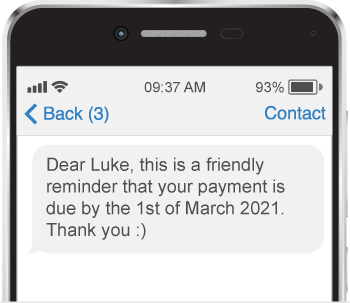

Overview
Vox has used Everlytic for marketing and client-critical notifications since 2013 and has achieved incredible success using its sending infrastructure. In this case study, we explore how Vox integrates with Everlytic’s transactional product to automate client comms via email, SMS and voice; initiatives that help Vox improve payment collections from clients, boost efficiencies, and scale its business.
Objectives
Vox uses Everlytic’s transactional sending infrastructure in multiple ways. The Vox Production account uses it to send all its client-critical emails and SMSs, while the Vox Debtors division uses it for an SMS and voice broadcasting strategy to improve payment collections.
Vox uses the platform in this way to simplify and automate comms, so clients are always updated on what’s going on with their tickets, orders, and accounts. This lightens the load on customer-service agents, giving them maximum capacity to scale operations and improve efficiencies.
Execution
Vox Production Mail
Vox Production uses Everlytic’s transactional-messaging platform via API in its Operations Support System and Business Support System (OSS / BSS) platform to send about a million ticketing and billing-related messages a year. These messages include:
- Ticket watcher notifications
- Support ticket reference numbers
- Payment method updates
- Contract acceptances
- One-time pins (OTP)
- Credit approvals
- Product-usage notifications
- Order status confirmations
- Product activations
- Installations
- Invoices
- Account statements
- Payment reminders
- Suspension notices
- Final-demand notices
- Reactivation reports
- Service cancellation confirmations
- Order provisioning
- Contract acceptance requests
- Workflow approvals, like:
- Credit memos pending
- Cancellation date lapses
- Collection and status updates
The API call is triggered by actions and automated workflows in the OSS / BSS and pushes information through Everlytic’s transactional infrastructure to send system-generated updates to both clients and staff. Reporting is then pushed from Everlytic, back into the OSS / BSS system, where the team can monitor message engagement in one system.
The kind of message engagement it tracks includes:
- How many were sent
- How many were successfully delivered
- How many failed or bounced
- How many were opened
- The click activity on the messages
The OSS / BSS also relies on Everlytic callbacks to record and display this information. This provides an audit trail for billing, support, and sales agents to cross-check in debt-recovery processes and disputes.
Vox Debtors Strategy
The Vox Debtors division incorporates an additional strategy by implementing SMS and voice broadcasting (in tandem) to notify clients about:
- Invoice due dates (payment reminders)
- Suspension warning
- Cancellation warning

“Customers are receiving notifications reminding them of invoice due dates, suspension warnings on overdue accounts, and notifications of our intent to cancel when an account remains unpaid.
Customers can respond to these SMS notifications, which enables us to attend to and resolve queries timeously and efficiently before any of the above takes place. This helps us reduce the number of unpaid accounts as customers no longer forget that their invoice is due on a specific day.”
– Robyn de Keijzer, Debtors Manager at Vox
Voice Solution
The Vox Debtors division uses pre-recorded voice broadcasts to remind clients about account payments. This is the script it uses:
Dear Vox Customer, according to our records, we have not received your payment. This is a reminder to settle your account in order to avoid interruption of services. For more details relating to your outstanding account, please refer to your latest invoice or visit our website on www.vox.co.za.
The way voice is being used here is on trend with how banking and financial institutions use voice messaging for collections, updates, fraud alerts, and overdraft updates.
Solution Results
Some of the results from implementing the solution include:
- Room to Scale
Integrating with transactional email and SMS gave Vox room to scale, while still engaging with customers in real-time, when they need it. - Lighter Load on Team
The integration alleviates the burden of processing notifications individually and manually, as system-generated messages are triggered automatically by updates in the OSS / BSS. - Personalised Campaigns
Message automation sends emails when the customer sets off specific triggers, enabling Vox to target subscribers with the relevant updates they need. - Improved Efficiency
Accelerated operations reduces the burden of highly repetitive, data-intensive tasks, and helps maintain compliance by reducing the chances of human error. - Improved Dispute Resolution
Debtors, salespeople, and account managers can track which messages were read, clicked on, etc, by the recipient.
Success Factors
The solution is supported by various factors, including:
- API integrations with billing and OSS / BSS systems ensure that multiple systems speak to each other, streamlining processes.
- Transactional messaging that sends system-generated messages in response to changes in the billing and OSS / BSS systems.
- Tracking message engagement directly in the OSS / BSS enables Vox to analyse who opens and clicks on their messages from the same platform they use to engage with clients, so they can provide superior support.
- Automation and personalisation ensures that Vox’s clients get the right message at the right time, with content that’s relevant to them.



